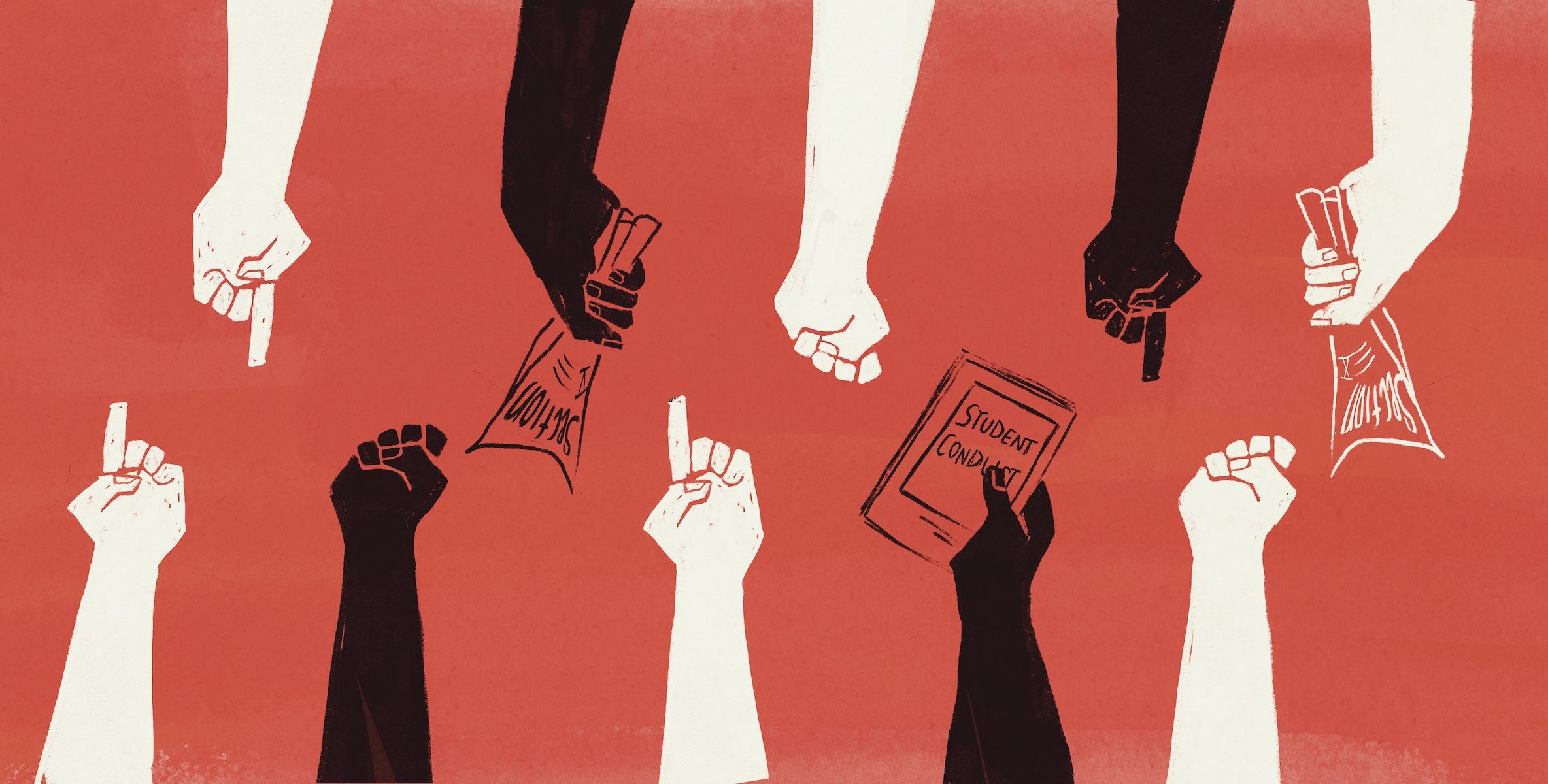This piece is part of an issue with a content warning regarding police violence. For a full acknowledgement of the content warning and source anonymity, please visit our article: About this special issue.
Protesters intentionally broke into the Branford Price Millar Library—renamed the Refaat Alareer Memorial Library by the protestors—on Monday, April 29. This began an occupation that would last until the early hours of Thursday, May 2 when the Portland Police Bureau (PPB) cleared the library, arresting several protesters. Portland State President Ann Cudd issued a statement on May 3, explaining the library would likely remain closed for repairs until the fall 2024 term.
“We put a really big importance on making sure we were all there for the right reasons, and that we were all united, and that we respected knowledge, because knowledge is power,” said one protester by the name of Quinn.
The protest—led by students and supported by non-student organizers—sought to draw attention to global issues while advocating for non-violence. However, despite their intentions, the occupation significantly damaged the library and its resources. According to organizers Ember and Robin and from what the PSU Vanguard staff witnessed during a tour after the occupation, most of the damage was extensive graffiti.
However, several computers and vending machines were also broken, and the fire alarm system was rendered unusable. Within a week, the university restored the fire suppression system and turned it back on. On Monday, May 15, the Office of Information Technology did a walk-through and is still in the process of assessing the damage to the equipment.
The library’s insurance policy contains a $100,000 deductible, and Emery said they plan to use the coverage fully. In a press conference with Cudd on May 15, she discussed the costs of the repair, “We have an initial estimate of $750,000 in damages to the building, but this does not include any of the technology systems or furniture that have been destroyed,” she said. “So I expect the full estimate to surpass $1 million.”
On Thursday and Friday, protestors tried to camp in the park blocks but were swept by PPB each time. After the sweep where PPB came and tore down a few tarps and removed a few tents around 3 p.m. on Friday, April 26, protesters moved to the library steps and created a barricade on the right side, with the left side remaining open to anyone who needed to access the library. A pro-Palestine rally in the park blocks had prompted the administration to close the library at noon on Monday, April 29. According to Ember and Robin, protesters later gained access through the library door, which caused a security camera to fall and break a window.
According to the organizers, most of the damage—besides the graffiti—occurred within the first hour, including the broken computers, vending machines, etc. After that, a protocol was established to keep peace within the library. Patrols ensured people didn’t go to the higher floors, and people who caused problems or damaged property were warned or kicked out.
The organizers explained the occupation was run by horizontal leadership, with no formal leadership positions other than the medics who set up a medical tent in one of the study rooms on the first floor. Some of the medics possessed formal training, while others did not.
“There weren’t specific roles,” said James, one of the protesters. “I think in a capitalist society you are taught that people don’t act selflessly, but that was not the case here. Everyone was willing to help out where they could. Some people were even cleaning the bathroom out of their own accord.”
According to James, student use was still encouraged by the community during the protest. “What’s happening here today is no different than when students come in anyway,” James said. “It [the library] looks a little bit different… We may be wearing different clothing, flying a different flag. But the point is, these are still your peers here. You may not recognize them, but nothing has changed. We want what the university wants. And we want people to be able to foster their education here. And if you need absolutely anything, you can talk to absolutely anyone, and we will find the right person for you to get your needs met.”
James explained housekeeping was a unanimous effort and protesters began cleaning immediately, noting they aimed to respect the space and incur minimal damage.
“We want to respect your space as students and we’ve made sure that any damages incurred have been cleaned,” James said. “We do want to make sure that we are separate from the people who would do evil while we are trying to show so much love.”
In a Faculty Senate meeting on May 6, Jill Emery—Collection Development & Management Librarian and Professor—said she and other library staff are appalled their built environment has become the backdrop of such destruction.
“We’ve heard from colleagues and students that the vandalism in the library depicts such vitriol and hatred that they’re not sure they will ever feel safe in it again,” Emery said. “Further, as the only space readily open to all the Portland community by our own advocacy, we are now closed to everyone.”
Emery explained much of the discourse surrounding the library occupation and its impact has revolved around the building and the collections but not around the library faculty and staff, who have also been affected by the situation. Emery said she feels disenfranchised by the way the media and the campus community have been ignoring the people who helped create and maintain the library.
“I don’t think I’m alone among my library colleagues in feeling this way,” Emery said. “We’re not just invisible in all of this, but seemingly erased entirely in the media and the outside public conversations occurring around it. We ask that you not rely on the portrayals being made by social media pundits, the occupying factions and our local news outlets. We are well attuned to their intentions.”
Emery also echoed Cudd’s email stating the library will be open by fall. She explained this does not necessarily mean the repairs to the library will take until fall to complete or the library will not be open before fall but that this is merely a time limit. The timeline depends on what work facilities must do, she said.
During the Faculty Senate meeting, Cris Paschild—Associate Dean of the Library and Head of Special Collections—explained this experience was particularly chilling for her since the library contains materials not covered by insurance, such as historical archives.
“We’re the home of a pretty significant archive for the community of Portland, and that’s a lot of important history of people who’ve chosen to trust Portland State because of our mission,” Paschild said. “It was a pretty awful week as the archivist, overseeing that collection and trying to find out what was going on.”
Against advice from the administration, Paschild had entered the occupied library that Tuesday and spoke with protesters about the value of the special collections and community archives. “The people I spoke to were incredibly receptive to what I said,” Paschild said. “I felt that they were really genuine. They helped me move more items into a secured area, barricaded the space and assured me that they were going to try to keep other people out.”
In a separate interview with Vanguard, Paschild explained she returned Wednesday and saw the special collections had been barricaded, and graffiti had been written on the walls to “protect the archives.”
Paschild also expressed her perplexity with some of the damage done to the library, including the shattering of the door to the Thomas C. Bielavitz Graduate Student Collaboration Hub on the fifth floor, damage to plasma screens, the removal of fire hoses and disabling of the entire fire safety system.
In an interview with Vanguard, Emery said the phone and other equipment cords had also been cut in certain areas. Though most of the equipment is still there, she said they are entirely unusable.
Additionally, Emery said some Oregon state documents containing different statutes and laws were damaged and may require re-binding. With no commercial bindery in Oregon or Washington, they would have to ship these materials to Nebraska—an expensive process which Emery said could take months.
These materials were a necessary resource for a program started in the past year which connected prison inmates with higher education materials and other tools to better their lives while incarcerated. Since inmates cannot access electronic documents, physical documents are necessary.
Some protesters argued that the interruption of library services is insignificant when considering the violence civilians in Gaza have been experiencing for over 200 days.
“We cannot continue focusing on our own work while these kids die,” said Holden Demetrius, a PSU student and protester. “We are all having this issue across the students, the teachers and the broader community. We are hurting and we are not good with this war. We need to move together to make it stop.”
After police cleared the library, rumors circulated that many books had been damaged and the entirety of the Dark Horse comics collection had been stolen. Librarians have disproved the rumor, stating that the vast majority of books were not damaged and that the Dark Horse collection remains intact, since it was removed prior to the occupation.
“I was immensely relieved when we went in the building and saw how much of the stacks were okay and how much of how much was fixable,” said Rose Bosely—the Library Access Services Manager. “However, those books don’t do anybody any good if we can’t get to them. What people are emailing us asking for—what they’re calling us asking for—is in that building, but we cannot safely get to it. It could be a while, a long time, before we can. It is really distressing.”
Bosely said she wants to focus on what the library staff can do for students and faculty right now and they plan to build up their services until they can get back to normal.
Currently, Bosely said the library is operating a desk in Fariborz Maseeh Hall from 10 a.m. to 3 p.m. on weekdays where students, faculty and members of the public can go to ask library staff questions on how to return library materials they checked out prior to the occupation, general research questions and receive help with assignments. Bosely said the only book drop still operational is the one on Southwest 10th and Montgomery. Anyone with questions should email circ@pdx.edu.
“We’re going to sit in disquieting solidarity to get through to the next iteration of who we are and how we work together,” Emery said.
Though the library’s physical damage was significant, all three librarians agree the real damage to this situation goes much deeper.
“Honestly, some of our most upset patrons are members of the public who could come to that library every single day, and we know them by name,” Bosely said. “A lot of them are very upset that their regular place is gone. That actually might be even more so, than physical damage to the building.”
Due to the fact that short-staffing is a campus-wide issue, Emery stated the allocation of resources towards library repairs would detract from what could otherwise be provided to students.
“It’s not just our labor,” Emery said. “It’s labor all across campus that now has to be refocused and redirected in this very specific way and that’s great, but we are short staffed across the whole entire campus and that means the resources aren’t going to students in the same way they used to. Because now the focus has to be working on this.”
As librarians and archivists, Paschild explained she and the rest of the library staff are invested in the importance of preserving shared knowledge and history. An attack on a library, Paschild explained, is an insidious tool which undermines culture and communities, sequesters knowledge and erases history.
“You can look at examples throughout history; it’s one of the go-to moves,” Paschild said. “And I know that wasn’t the intention here, but I think it’s hard to not have a very visceral response when you see a library taken over. I’m trying to reconcile that with my understanding of people’s intentions, people’s sincerity and their real concerns with that… symbolic impact.”






